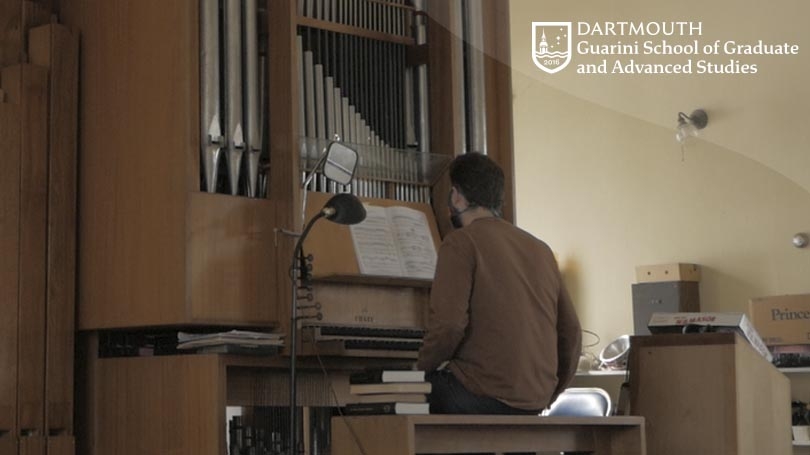Thanks to the generosity of a number of loyal graduates of Dartmouth's graduate programs, the Alumni Fund and the Guarini School of Graduate and Advanced Studies have received donations which have been placed into a special alumni graduate fund to support graduate student research.
For me, what is particularly special about making music is the way in which – in the best of circumstances – it creates a space for people to be deeply present with each other. It allows for collective relationships to be formed that are complex and meaningful, utilizing nonlinguistic forms of exchange and communication to bring us together. One of the many losses I have experienced during the pandemic is my regular ritual of making music in person with others. The vibrant social energy that arises from singing, playing instruments, listening, and dancing together is, for the time being, dormant. It sits silently in our imaginations, waiting for the day to come when we can reconvene together safely.
In this absence, I have been spending much solitary time with the instrument that is dearest to my heart: the pipe organ. This instrument, for me, was the first object that allowed me to grasp the power of sound to heal, to express, and to connect with others. It was the instrument which grounded me when I most needed it, providing a space for solemn contemplation as well a space for joyous celebration. From my relationship with this instrument grew my development as a musician, composer, and as a member of various cultural communities.
For someone who is a firm believer in the collective power of musicmaking, the pipe organ is in many ways a troubling instrument; full of contradiction. They are immobile, quite literally fixed to the ground where they are installed. In size, they make a guitarist with a wall of Marshall stacks seem puny in comparison. They are often extremely expensive to design, build, and maintain and are primarily placed in locations that inhibit their access to people who do not belong to particular religious communities or who do not regularly visit concert halls with organs installed. The organ, among the many instruments, is perhaps one of the easiest to call an irrelevant relic of history, and yet, under the right circumstances, the instrument is a powerful force for organizing collective ritual through sound. I am interested in exploring the organ, not as a historical artifact, but as a tool for future exploration of sound in space and within particular social formations.
Before the pandemic, my hope was to spend this past year organizing an improvising music ensemble in the Upper Valley composed of community members and Dartmouth faculty and students. It was my intention that we would study the ways in which previous musical ensembles which feature a diversity of ages, cultural backgrounds, identities, and abilities created organizational models to effectively allow for equitable, collective musical production. I would personally join this ensemble playing the organ and attempting to navigate the issues of how to play this monolithic instrument within an ensemble setting. I was going to use these vital experiences to help direct and inform the thrust of my thesis, but as time went on, it seemed less and less likely that this work was going to be able to be conducted in a safe manner. As we all have had to do, I pivoted the orientation of my work to function better in the practicalities of working safely during a pandemic.
In light of these changes, my work towards the Digital Musics master's thesis has focused on reclaiming the organ as a site of speculation for future collective musical ritual which incorporates experimental approaches to soundmaking, spatial organization, and social facilitation. While yet remaining isolated for the time being, I have created texts, organizational procedures, sound pieces, scores, and videos which have allowed me to reimagine and explore the multifarious dimensions of the organ as an organizer of complex forms of ritual.
The generous support from the Alumni Research Award has allowed me to interview people from various musical backgrounds on their experience of the intersection between music and sociality, invest in research materials to broaden my reference points to community music making, and spend time creating new work for the organ through musical composition, improvisation, and digital multimedia. While the work I have been able to make has been less "hands on" and social than I had originally hoped, the research I have undertaken with the support of this award has best prepared me to put my plans to practice once we are safe to be together again. I am grateful for this support, as it has allowed me the resources and time to adequately reflect and dream on how the organ can be a force for utopian musical collectivity.
